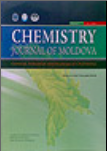Chemistry Journal of Moldova
2019 Volume 14, no.2
Author(s):
Field: Natural product chemistry and synthesis
Type: Research paper
Issue: 2019 Volume 14, no.2
Pages: 79-89
Hichem Mohammedi, Samira Idjeri-Mecherara, Fouad Menaceur, Aicha Hassani
Field: Natural product chemistry and synthesis
Type: Research paper
Issue: 2019 Volume 14, no.2
Pages: 79-89
Full Text (PDF): Download
Abstract (PDF)
Graphical Abstract: This paper focuses on the study of the effect of extraction solvent choice on phenolic compounds contents and antioxidant activity of Bassia muricata. In this study, five different solvents namely: water, acetone, ethanol, methanol and hexane, and three extraction techniques were used to extract phenolic compounds: microwave-assisted extraction, Soxhlet and maceration. Total phenolics, total flavonoids and condensed tannins contents were determined. The results showed that different solvents with different polarity had a major effect on polyphenolic contents and antioxidant activity. Microwave-assisted extraction was the best suited for the extraction of antioxidant molecules when compared to Soxhlet and maceration.
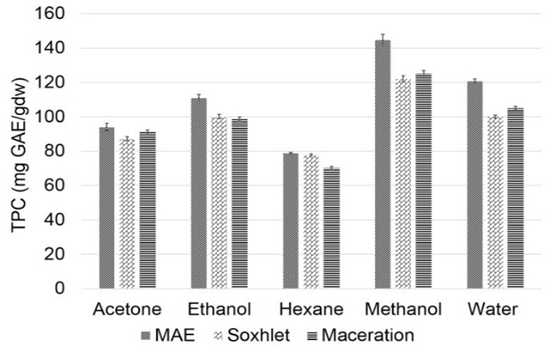
Graphical Abstract: This paper focuses on the study of the effect of extraction solvent choice on phenolic compounds contents and antioxidant activity of Bassia muricata. In this study, five different solvents namely: water, acetone, ethanol, methanol and hexane, and three extraction techniques were used to extract phenolic compounds: microwave-assisted extraction, Soxhlet and maceration. Total phenolics, total flavonoids and condensed tannins contents were determined. The results showed that different solvents with different polarity had a major effect on polyphenolic contents and antioxidant activity. Microwave-assisted extraction was the best suited for the extraction of antioxidant molecules when compared to Soxhlet and maceration.

Downloads: 232
Author(s):
Field: Organic chemistry
Type: Research paper
Issue: 2019 Volume 14, no.2
Pages: 90-96
Jumina Jumina, Rizky Woro Styaningrum, Dwi Siswanta, Sugeng Triono, Yoga Priastomo, Harizal Harizal, Eti Nurwening Sholikhah, Abdul Karim Zulkarnain
Field: Organic chemistry
Type: Research paper
Issue: 2019 Volume 14, no.2
Pages: 90-96
Full Text (PDF): Download
DOI: http://dx.doi.org/10.19261/cjm.2019.624
Abstract (PDF)
Graphical Abstract: Four chalcone derivatives were synthesized and pre-evaluated as broad-spectrum UV protector. Chalcones 1-4 showed a wide range of UV absorbance values and moderate molar absorptivity values. Chalcones 3 and 4 showed better photostability than chalcones 1 and 2 because the lowering of their absorbance was smaller and slower under UVB irradiation. A combination of the spectra of chalcone derivatives 1-4 indicated that a formulation containing all four will provide a broad-spectrum sunscreen protecting the skin from UVA and UVB.

Graphical Abstract: Four chalcone derivatives were synthesized and pre-evaluated as broad-spectrum UV protector. Chalcones 1-4 showed a wide range of UV absorbance values and moderate molar absorptivity values. Chalcones 3 and 4 showed better photostability than chalcones 1 and 2 because the lowering of their absorbance was smaller and slower under UVB irradiation. A combination of the spectra of chalcone derivatives 1-4 indicated that a formulation containing all four will provide a broad-spectrum sunscreen protecting the skin from UVA and UVB.

Downloads: 270
Author(s):
Field: Organic chemistry
Type: Research paper
Issue: 2019 Volume 14, no.2
Pages: 105-116
Nadia Ali Ahmed Elkanzi, Amira Atef Ghoneim, Hajer Hrichi
Field: Organic chemistry
Type: Research paper
Issue: 2019 Volume 14, no.2
Pages: 105-116
Full Text (PDF): Download
DOI: http://dx.doi.org/10.19261/cjm.2019.638
Abstract (PDF)
Graphical Abstract: In this study, novel pyrazole, imidazole, pyrimidine derivatives bearing imidazo[4,5-b]indol moiety were successfully synthesized and their chemical structures were identified and confirmed by different spectral techniques. All the synthesized compounds were tested against four bacterial strains (Bacillus subtilis, Staphylococcus aureus, Escherichia coli, and Pseudomonas aeruginosa) and two fungi (Aspergillus flavus and Candida albicans). The obtained results show that the synthesized compounds could find fruitful applications as antibacterial and antifungal agents in pharmaceutical chemistry.
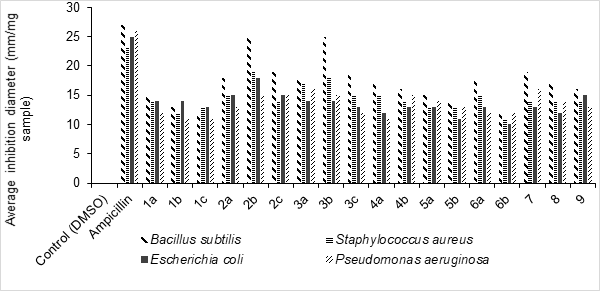
Graphical Abstract: In this study, novel pyrazole, imidazole, pyrimidine derivatives bearing imidazo[4,5-b]indol moiety were successfully synthesized and their chemical structures were identified and confirmed by different spectral techniques. All the synthesized compounds were tested against four bacterial strains (Bacillus subtilis, Staphylococcus aureus, Escherichia coli, and Pseudomonas aeruginosa) and two fungi (Aspergillus flavus and Candida albicans). The obtained results show that the synthesized compounds could find fruitful applications as antibacterial and antifungal agents in pharmaceutical chemistry.

Downloads: 213
Author(s):
Field: Ecological chemistry
Type: Research paper
Issue: 2019 Volume 14, no.2
Pages: 62-71
Raisa Sircu, Gheorghii Turcanu, Nicolae Opopol, Iurie Pinzaru, Tatiana Manceva, Raisa Scurtu
Field: Ecological chemistry
Type: Research paper
Issue: 2019 Volume 14, no.2
Pages: 62-71
Full Text (PDF): Download
Abstract (PDF)
Graphical Abstract: A total of 5206 samples from twenty-one different vegetables and fruits were collected. Residues of pesticides in concentrations exceeding the maximum residue levels were found in 22.9% of analysed samples. Thirteen insecticides, four fungicides, two acaricides and one herbicide were detected in the analysed samples. The highest value of hazard index was calculated for diazinon – 0.15. The obtained results show that the long-term consumption of vegetables and fruits could pose a health risk for the population of the Republic of Moldova.

Graphical Abstract: A total of 5206 samples from twenty-one different vegetables and fruits were collected. Residues of pesticides in concentrations exceeding the maximum residue levels were found in 22.9% of analysed samples. Thirteen insecticides, four fungicides, two acaricides and one herbicide were detected in the analysed samples. The highest value of hazard index was calculated for diazinon – 0.15. The obtained results show that the long-term consumption of vegetables and fruits could pose a health risk for the population of the Republic of Moldova.

Downloads: 143
Author(s):
Field: Ecological chemistry
Type: Short communication
Issue: 2019 Volume 14, no.2
Pages: 117-121
Oksana Stavinskaya, Iryna Laguta, Tetiana Fesenko, Marina Krumova
Field: Ecological chemistry
Type: Short communication
Issue: 2019 Volume 14, no.2
Pages: 117-121
Full Text (PDF): Download
Abstract (PDF)
Graphical Abstract: Silver nanoparticles colloids were prepared using the extract from the leaves of Vitex agnus-castus. The effect of temperature on the reduction of silver ions and on the growth of silver nanoparticles was followed by measuring the intensity of the surface plasmon resonance band in the UV spectra. It was found that fast reduction of silver ions occurs even at 40°C, while effective synthesis of silver nanoparticles requires elevated temperatures of 60-80°C.
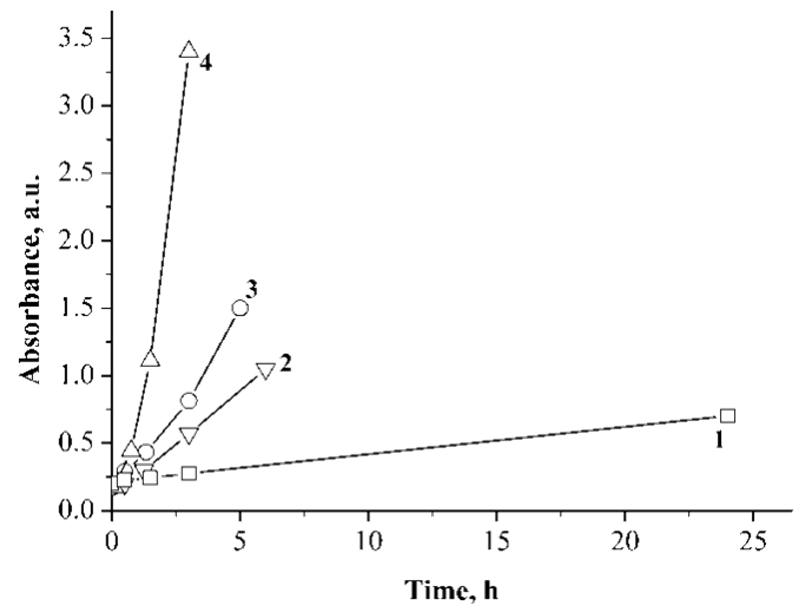
Graphical Abstract: Silver nanoparticles colloids were prepared using the extract from the leaves of Vitex agnus-castus. The effect of temperature on the reduction of silver ions and on the growth of silver nanoparticles was followed by measuring the intensity of the surface plasmon resonance band in the UV spectra. It was found that fast reduction of silver ions occurs even at 40°C, while effective synthesis of silver nanoparticles requires elevated temperatures of 60-80°C.

Downloads: 208
Author(s):
Field: Organic chemistry
Type: Research paper
Issue: 2019 Volume 14, no.2
Pages: 97-104
Maryam Shokoohian, Nourallah Hazeri, MalekTaher Maghsoodlou, Mojtaba Lashkari
Field: Organic chemistry
Type: Research paper
Issue: 2019 Volume 14, no.2
Pages: 97-104
Full Text (PDF): Download
Graphical Abstract: 4-(Dimethylamino)pyridine was found to be an efficient homogenous catalyst for one-pot multi-component reactions between hydrazine monohydrate, ethyl cyanoacetate, ketone, and malononitrile for the synthesis of 1,6-diamino-2-oxo-1,2,3,4-tetrahydropyridine-3,5-dicarbonitrile derivatives using ultrasonication at room temperature in ethanol solution within 35-50 min with yields of over 90%.

Downloads: 137
Author(s):
Field: Organic chemistry
Type: Review
Issue: 2019 Volume 14, no.2
Pages: 32-55
Serghei Curlat
Field: Organic chemistry
Type: Review
Issue: 2019 Volume 14, no.2
Pages: 32-55
Full Text (PDF): Download
Abstract (PDF)
Graphical Abstract: This review presents last decade and some past especially relevant studies in the field of (+)-3-carene synthetic transformations. This paper discusses exclusively the transformations of (+)-3-carene, proceeding with the retention of the native bicyclic carbon skeleton. The data concerning the features of epoxidation and oxidation reactions of (+)-3-carene, the synthesis of sulphur- and selenium-containing derivatives and their use in asymmetric synthesis are given. It also describes methods for producing amino derivatives of (+)-3-carene, substituted heterocycles based on it, reactions for the preparation of aziridines, azido-alcohols and azidoamines, as well as chiral phosphites as bidentate ligands.

Graphical Abstract: This review presents last decade and some past especially relevant studies in the field of (+)-3-carene synthetic transformations. This paper discusses exclusively the transformations of (+)-3-carene, proceeding with the retention of the native bicyclic carbon skeleton. The data concerning the features of epoxidation and oxidation reactions of (+)-3-carene, the synthesis of sulphur- and selenium-containing derivatives and their use in asymmetric synthesis are given. It also describes methods for producing amino derivatives of (+)-3-carene, substituted heterocycles based on it, reactions for the preparation of aziridines, azido-alcohols and azidoamines, as well as chiral phosphites as bidentate ligands.

Downloads: 154
Author(s):
Field: Natural product chemistry and synthesis
Type: Research paper
Issue: 2019 Volume 14, no.2
Pages: 72-78
Svetlana Blaja
Field: Natural product chemistry and synthesis
Type: Research paper
Issue: 2019 Volume 14, no.2
Pages: 72-78
Full Text (PDF): Download
Abstract (PDF)
Graphical Abstract: TThe present paper reports the synthesis of new hybrid terpeno-heterocyclic compounds belonging to di- and tri-norlabdane series. Starting from natural labdane diterpenoide (-)-sclareol, via its intermediates 8α-hydroxy-15,16-dinorlabd-13-one and sclareolide, two di-norlabdane and three tri-norlabdane, previously unreported compounds possessing 2-amino-1,3-thiazole structural units were obtained in three and four steps, respectively, with acceptable to good overall yields. The structures of newly obtained compounds were confirmed by means of spectral IR, 1H and 13C NMR analyses.

Graphical Abstract: TThe present paper reports the synthesis of new hybrid terpeno-heterocyclic compounds belonging to di- and tri-norlabdane series. Starting from natural labdane diterpenoide (-)-sclareol, via its intermediates 8α-hydroxy-15,16-dinorlabd-13-one and sclareolide, two di-norlabdane and three tri-norlabdane, previously unreported compounds possessing 2-amino-1,3-thiazole structural units were obtained in three and four steps, respectively, with acceptable to good overall yields. The structures of newly obtained compounds were confirmed by means of spectral IR, 1H and 13C NMR analyses.

Downloads: 186
Author(s):
Field: Analytical chemistry
Type: Research paper
Issue: 2019 Volume 14, no.2
Pages: 56-61
Livia Uncu, Elena Donici, Vladimir Valica, Oxana Vîslouh, Veaceslav Gonciar, Sergiu Parii
Field: Analytical chemistry
Type: Research paper
Issue: 2019 Volume 14, no.2
Pages: 56-61
Full Text (PDF): Download
Abstract (PDF)
Graphical Abstract: A simple, precise and accurate UV-Vis spectrophotometric method has been developed and validated for the estimation of ciprofloxacin hydrochloride from combination ear drops with basil oil (Ocimum basilicum). The results of the validation of the method demonstrate that the developed method is simple, rapid, accurate and robust over the concentration range 2-10 μg/mL of ciprofloxacin hydrochloride in combination with volatile basil oil.
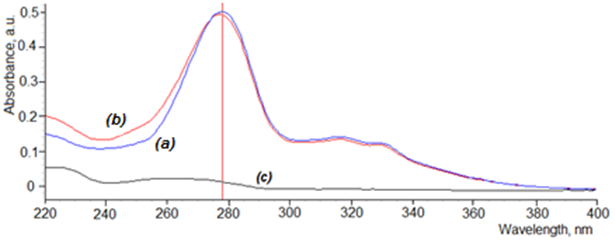
Graphical Abstract: A simple, precise and accurate UV-Vis spectrophotometric method has been developed and validated for the estimation of ciprofloxacin hydrochloride from combination ear drops with basil oil (Ocimum basilicum). The results of the validation of the method demonstrate that the developed method is simple, rapid, accurate and robust over the concentration range 2-10 μg/mL of ciprofloxacin hydrochloride in combination with volatile basil oil.

Downloads: 178
Author(s):
Field: Natural product chemistry and synthesis
Type: Invited paper
Issue: 2019 Volume 14, no.2
Pages: 9-31
Margherita Gavagnin, Marianna Carbone, Maria Letizia Ciavatta, Ernesto Mollo
Field: Natural product chemistry and synthesis
Type: Invited paper
Issue: 2019 Volume 14, no.2
Pages: 9-31
Full Text (PDF): Download
Abstract (PDF)
Graphical Abstract: Heterobranchs are a fascinating group of marine mollusks that are recognized as an important source of bioactive natural products. Often, these molecules, which are either selected from the diet or de novo biosynthesized by the mollusks, play a fundamental role for their survival being utilized as defensive chemicals against predators. A summary of the studies carried out, in the last decade, on heterobranchs is presented here. A number of new compounds exhibiting different molecular architectures were chemically characterized.

Graphical Abstract: Heterobranchs are a fascinating group of marine mollusks that are recognized as an important source of bioactive natural products. Often, these molecules, which are either selected from the diet or de novo biosynthesized by the mollusks, play a fundamental role for their survival being utilized as defensive chemicals against predators. A summary of the studies carried out, in the last decade, on heterobranchs is presented here. A number of new compounds exhibiting different molecular architectures were chemically characterized.

Downloads: 108
